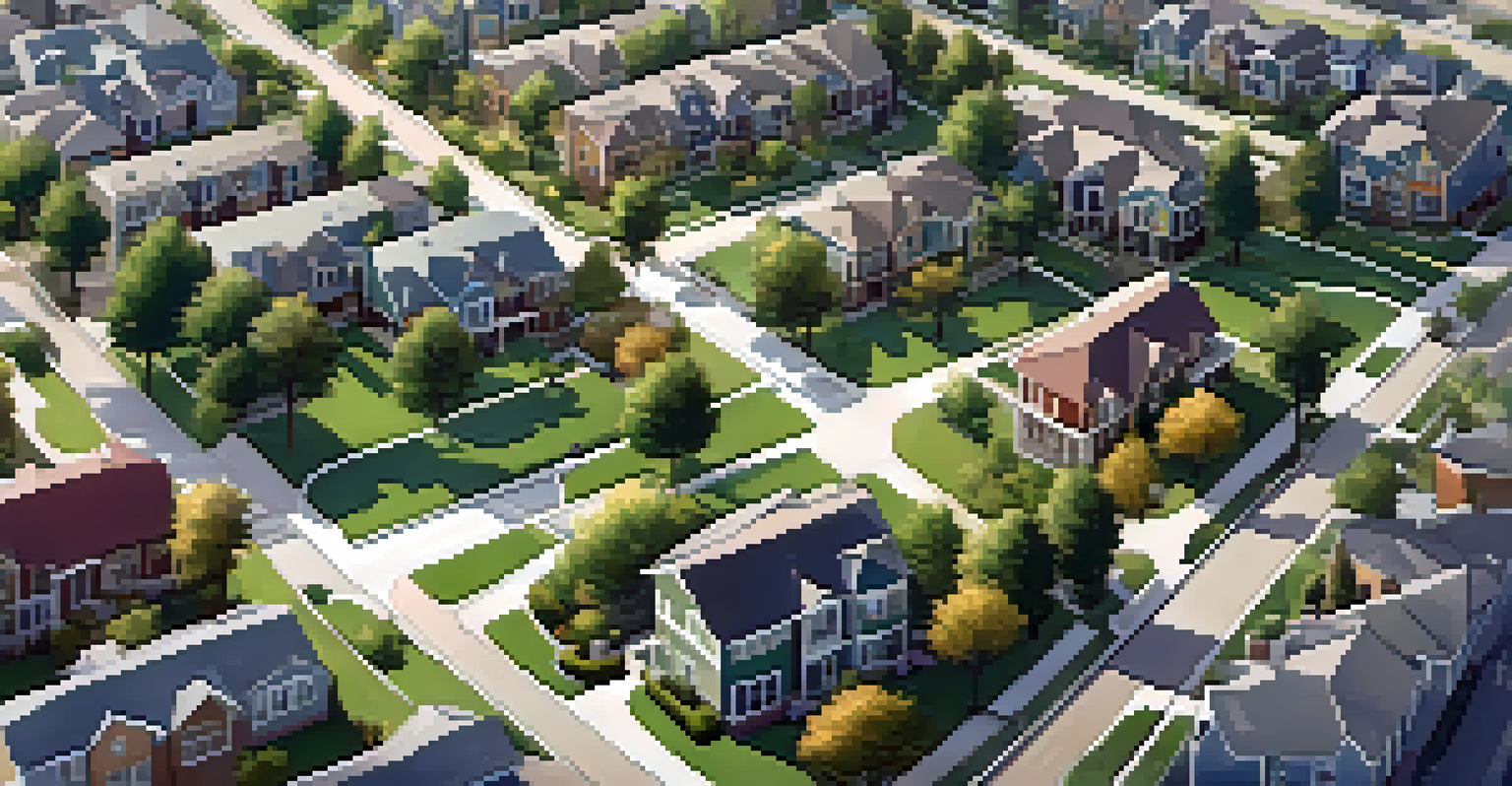The Importance of Zoning Laws in Property Valuation

What Are Zoning Laws and Why Do They Matter?
Zoning laws are regulations that govern how land can be used in specific areas. They dictate whether a property can be residential, commercial, industrial, or agricultural. This classification is crucial for maintaining order and ensuring that land use aligns with community goals.
Zoning laws are the backbone of urban planning, ensuring that communities grow in an organized and sustainable manner.
For example, if a residential neighborhood suddenly allows factories, it can disrupt the local environment and reduce home values. Thus, zoning laws help protect property owners from incompatible developments. They create a predictable framework for both current residents and future investors.
Understanding zoning laws is essential for anyone involved in real estate, as they directly influence property valuation. A property in a zone that allows for diverse uses typically has a higher value than one restricted to a single use. This dynamic highlights the importance of staying informed about local zoning regulations.
How Zoning Laws Influence Property Values
Zoning laws can significantly affect the market value of properties. For instance, a residential property located in a zone designated for commercial use can see its value skyrocket due to potential development opportunities. Conversely, a property in an area where zoning laws restrict development may experience stagnant or declining value.

Additionally, the perception of an area can shift based on zoning designations. If a neighborhood is rezoned to allow for mixed-use development, it can attract businesses and amenities, making the area more desirable. This increase in desirability often translates to higher property values.
Zoning Laws Shape Land Use
Zoning laws regulate land use, ensuring that property classifications align with community goals and protect property values.
Investors and homeowners alike should keep a close eye on local zoning changes. Understanding these laws can help in making informed decisions about buying or selling property. When zoning laws support growth and development, property values can flourish.
The Role of Zoning in Urban Planning
Zoning laws play a critical role in urban planning, shaping the development and functionality of cities. By designating specific areas for different types of use, planners can create cohesive communities that serve the needs of their residents. This strategic planning helps avoid chaos and promotes livability.
The value of a property is not only determined by its physical characteristics but also by its zoning and the potential uses allowed.
For example, placing parks and schools within residential zones encourages families to settle in those areas. This thoughtful approach not only enhances community appeal but also stabilizes property values. Well-planned environments tend to attract more buyers and investors.
Ultimately, effective zoning contributes to a balanced urban ecosystem. It ensures that commercial, residential, and recreational spaces coexist harmoniously, which is a key factor in maintaining and increasing property values over time.
Zoning Variances and Their Impact on Property Valuation
Sometimes, property owners may seek zoning variances to deviate from established laws. A variance allows for specific exceptions, such as building a larger structure than typically permitted. While variances can enhance property potential, they can also lead to mixed reactions from the community.
For instance, if a homeowner receives a variance to construct a commercial building in a residential area, it may elevate their property value. However, it could also upset neighbors who value the existing residential atmosphere. This tension can ultimately affect the overall market value of surrounding properties.
Zoning Affects Property Values
Zoning designations impact property values significantly, as areas allowing mixed-use development tend to attract investment and increase desirability.
Therefore, understanding the implications of zoning variances is critical for property owners and investors. While they can present opportunities, they also come with risks that may influence future property valuations and community dynamics.
The Impact of Zoning on Real Estate Investments
For real estate investors, zoning laws are a vital component of investment strategy. Knowing the zoning regulations helps investors identify properties with the highest potential for appreciation. Properties in areas with favorable zoning for development or mixed-use can yield significant returns.
Additionally, changes in zoning can create investment opportunities. For example, if an area is proposed for rezoning to allow for commercial development, savvy investors may purchase residential properties in anticipation of future value increases. This foresight can lead to profitable ventures.
However, it's essential to conduct thorough due diligence. Investors should stay updated on local government plans and community feedback regarding zoning changes. This information can be the difference between a successful investment and a costly misstep.
Community Involvement and Zoning Decisions
Community involvement plays a crucial role in zoning decisions. Local residents often have the opportunity to voice their opinions during public hearings on proposed zoning changes. This participatory process ensures that the interests of those directly affected are considered.
When communities engage in the zoning process, they can help shape the future of their neighborhoods. For example, residents may advocate for zoning laws that promote green spaces or limit high-density developments to protect their quality of life. These collective actions can directly influence property values and community satisfaction.
Community Input Influences Zoning
Active community involvement in zoning decisions fosters neighborhood pride and can enhance property values by addressing local needs.
Ultimately, community input in zoning decisions fosters a sense of ownership and pride among residents. This not only enhances property values but also contributes to vibrant and cohesive neighborhoods where people want to live and invest.
Future Trends in Zoning and Property Valuation
As urbanization continues to evolve, zoning laws are likely to adapt to meet new challenges and opportunities. Trends such as increasing demand for mixed-use developments and sustainability initiatives are reshaping how zoning is approached. These changes can significantly impact property valuations.
For instance, cities are increasingly recognizing the value of walkable neighborhoods and reduced car dependency. This shift may lead to zoning reforms that promote higher-density, pedestrian-friendly developments, ultimately increasing property values in those areas. Investors should be attentive to these trends for potential opportunities.

Moreover, technology is playing a role in zoning practices, with data-driven decisions becoming more prevalent. This trend can enhance the efficiency and effectiveness of zoning regulations, further influencing property valuation. Staying informed about these emerging trends will be essential for anyone involved in real estate.